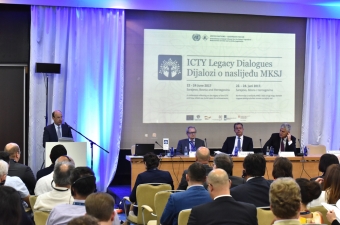After three days of discussions and exchanges the ICTY today concluded its final Legacy Conference, which took place from 22 to 24 June 2017 in Sarajevo, Bosnia and Herzegovina (BiH).
The Tribunal’s Principals, President Carmel Agius, Prosecutor Serge Brammertz and Registrar John Hocking, delivered welcoming remarks, after which His Excellency Dragan Čović, Member of the BiH Presidency, spoke on behalf of the Presidency and the host country. In his opening speech, President Agius emphasised that the aim of the Conference was “to ‘pass on the baton’ to stakeholders in the region, because it is [they] who will, in many ways, be responsible for carrying the Tribunal’s legacy on beyond 2017.”
Prosecutor Brammertz highlighted the crucial role played by national jurisdictions in the countries of the former Yugoslavia, stressing that: “Ensuring that national courts have the capacity to prosecute international crimes is therefore of paramount importance.”
Registrar John Hocking stated that: “In our courtrooms, the shields that protected Heads of State, Ministers, or Generals were pierced by the humble truth of their often powerless victims”, and explained how the Tribunal’s legacy will live on through efforts inside and outside courtrooms in the region and across the world.
During the Conference, regional and international participants discussed key areas of the Tribunal’s legacy, engaging in an active dialogue. In addition to eight main panel sessions, the Conference hosted ten side events, including book launches, a documentary premiere, the opening of an exhibition, and discussions of various regional transitional justice initiatives.
The panel discussions started with the normative legacy of the ICTY and its influences on national jurisdictions, followed by panels on the Tribunal’s gender justice and non-judicial legacies, which led to constructive debates with the audience. The second day of the Conference was dedicated to: the Tribunal’s operational legacy and how it can inform national prosecutions; the witness experience of testifying before the ICTY and local witness support mechanisms; and the role of Defence and lessons learned to ensure a fair trial. The day ended with an expert panel on the historical value of the Tribunal’s legacy. Panellists agreed that the Tribunal’s archives will be an important resource for historians, social scientists and others in the region and beyond.
The final panel of the Conference, reflecting on the Tribunal’s outreach efforts, took place this morning, emphasising the need for continuous education and information on the Tribunal’s work. The Conference concluded with the presentation of conclusions and recommendations emerging from the various panel discussions. It was emphasised that the ability of national jurisdictions to continue adjudicating war crimes cases in accordance with international standards will represent a cornerstone of the Tribunal’s legacy.
Mr Miguel de Serpa Soares, Under-Secretary-General for Legal Affairs and United Nations Legal Counsel, delivered the Closing Address, reflecting on the “moral legacy” of the Tribunal and commending “the legacy efforts undertaken by the ICTY as they will remind the international community that our work to ensure respect for human rights and the rule of law continues, that the cause of justice endures, and that the hope to end impunity lives on.”
The final Legacy Conference was one of the key events of the ICTY Legacy Dialogues, a series of events held over the course of this year to mark the closure of the ICTY, with the aim to enable others to build on its work and achievements.


